Command Chief Master Sergeant Dave Himmer, U.S. Air Force (Ret.) – Coming of Age in Vietnam
Veterans influence and inspire us, often to follow in their footsteps. Such was the case with Command Chief Master Sergeant Dave Himmer, U.S. Air Force (retired), who looked up to his high school history teacher – a Marine in World War II – and said, “I want to be like him”. Although Dave didn’t make it into the Marines right away, he did begin his long and distinguished military career with a combat tour as an Army infantry soldier in Vietnam. Since then, countless soldiers, airmen, and Marines have looked at Dave and said, “I want to be like him.” This is Dave’s story.
Dave grew up in a bygone era. He was born in March 1945 and raised on his family’s 160-acre farm southwest of Rochester, Minnesota, in a farming community called Pleasant Valley. His parents, Stan and Margaret Himmer, and their six children tended dairy cows, hogs, and chickens and grew corn, oats, and hay to feed the animals. Later, they rented an additional eighty acres, where they grew soybeans as a cash crop. Dave milked cows in the morning and again at night with the milk flowing into traditional milk cans. When it came time for harvest, the family did not have a combine so crops had to be bundled and pulled in wagons by horses to where it would be stored. Meats, fruits, and vegetables had to be canned for long-term storage because they didn’t have a freezer. The farm kept Dave and his three brothers and two sisters busy, but it also taught them the value of hard work and made their family very close. Another critical aspect of Dave’s family life was the strong Christian faith his parents modeled for him and his siblings. They taught the children the importance of daily prayer and active participation in their local parish community. Dave has continued these practices throughout his life.
Life on the farm wasn’t all work—it was fun, too. Dave loved working with the animals and was active in the Racine Ramblers 4-H Club. He enjoyed taking his farm’s livestock to the county fair and hunting around the farm, where rabbits, squirrels, and pheasants were plentiful. The family got its first telephone and television when Dave was around twelve, adding new entertainment options. Dave’s dad also built a milk house allowing the cows’ milk to flow directly into a large tank rather than into the heavy milk cans, acquired tractors and a combine for harvesting his crops, and installed a freezer making canning everything no longer necessary. These improvements reduced the family’s workload and gave them more time for other pursuits, like school and studying.
The Himmer children initially attended school in a one-room schoolhouse with no phone, indoor plumbing, or running water. Each morning, two students were assigned to walk to a farm across the road from the school to carry back water for students to drink and wash their hands. The school covered grades one through eight, but after Dave completed the fifth grade, the school consolidated with the Stewartville School District. That allowed Dave to attend Stewartville schools for grades six through twelve, including Stewartville High School.
Several of Dave’s high school teachers were World War II veterans who went to college on the GI Bill after the war. Their service during the war inspired Dave. Most influential was his history teacher, a Marine who fought his way across the Pacific in such battles as Guadalcanal, Tarawa, and Iwo Jima. Occasionally, the teacher would talk to his classes about his experiences in the Marines, mesmerizing Dave. So much so, Dave decided to follow in his history teacher’s footsteps and join the Marines as soon as he graduated from high school.
The hard work Dave did on his family’s farm kept him strong and in good shape, making him a natural for the Stewartville High wrestling team. He enjoyed being on the team and learned a lot from the experience, although he injured his knee, an injury that would hamper him during the latter part of his senior year and into his college years. Little did he know the seemingly minor injury would soon change the course of his life.
Dave graduated from Stewartville High School in May 1963 and tried to enlist in the Marine Corps. Unfortunately, the Marines would not take him because of his injured knee. Dave’s second option was college, so he enrolled in the fall at Rochester Community College. To get the money he needed for school, he took a part-time job at St. Mary’s Hospital in Rochester working in the maintenance department, which meant washing windows in the summer for the 1318-bed hospital for most of the day. While there, he took on another part-time job working for the Gold Cross Ambulance Company and did some work in the hospital’s emergency room. During a subsequent summer, he worked for a medical neurologist at the Mayo Clinic, assisting him with his cerebral vascular research.
Dave’s finances held out through the first year of college and extended into the second and third, although he had to take a reduced class load. He also wrestled for his college team, aggravating his knee injury, which now periodically filled with water and had to be drained. As the end of the quarter neared in the first week of December 1966, Dave’s boss at Gold Cross asked him to do a road trip with an ambulance. Dave didn’t want to go because he had a final exam that Friday he would have to miss, but agreed when his boss said he would call Dave’s professor and explain Dave’s absence. When Dave returned on Monday and asked his professor to allow him to take the test, his professor refused and failed Dave for the quarter. Angry and tired of living without money, Dave left college and began working full-time.
With school behind him, Dave set out on his own. Now working full-time for Gold Cross Ambulance, he lived in an apartment in Rochester. At the same time, the Vietnam War was escalating, and young men like Dave were being drafted for service in the Army and the Marines. Dave’s knee injury, however, continued to keep him out of the military. In fact, Dave was drafted after leaving college, but twice failed the physical because of his knee. At each physical, he produced a letter from his orthopedic doctor explaining the nature of his injury and the treatment he’d received. Each time he was sent home. Realizing his injury would keep him out of the military forever, Dave got engaged in 1967 and prepared to get on with his life. His doctor also treated his knee with Cortisone injections, which for the first time seemed to help his injury heal.
Toward the end of 1967 or early in 1968, Dave was again told to report to the Armed Forces Examining and Entrance Station on the second floor of the Minneapolis Post Office for his third draft-related physical. His report date was February 20, 1968, less than two weeks after he returned from his honeymoon and as images of the Tet Offensive dominated the news broadcasts on TV sets across America. Dave told his new bride not to worry and went to the physical, just as he had done two times before. When he gave the examining physician the letter from his orthopedic doctor, the physician tore it up in front of him. Dave was then shuffled into another room with the other draftees who had gotten their physicals. An Air Force officer stood at a podium at the front of the room and told the men to raise their right hands. Dave did not comply and they asked him why. He told them he wasn’t eligible to be drafted because his classification was 1-Y, not 1-A. Unfazed, they took him to another room, where he waited until two soldiers returned with a new draft card reflecting he was now 1-A. He then returned to the main room and raised his right hand with everyone else. He was officially in the Army.
Dave was shocked. He’d told his wife he’d be back shortly and now he had just five minutes to call her and tell her he was about to board a bus to the Minneapolis/St. Paul airport en route to basic training. After that difficult call, as he left the building to board the bus, protestors invited him and the other draftees to go to Canada. Although distraught with the turn of events, Dave thought of his high school history teacher, and of his uncle who fought in North Africa and Italy, and boarded the bus. He committed to serving his country just like they had, knowing full well he had likely just taken the first step to being shipped off to the war in Vietnam.
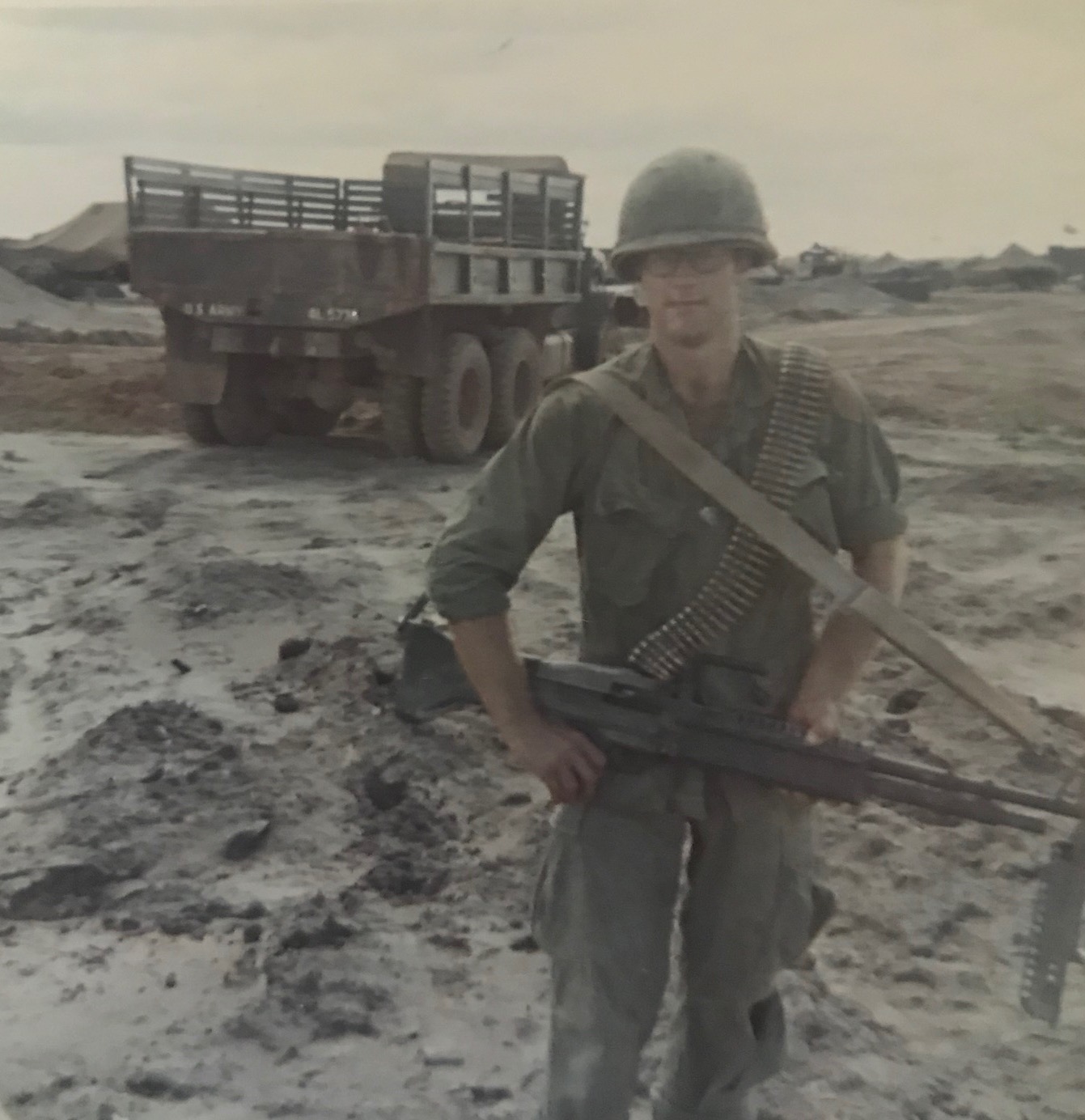
At the airport, Dave and the other draftees boarded a chartered flight that took them to Milwaukee, where more draftees filled the remaining seats. The now-full plane flew directly to Fort Campbell, Kentucky, where waiting soldiers screamed at them to get off the plane and into nearby buses. The temperature was a balmy four degrees below zero, six degrees warmer than it was when Dave left Minneapolis/St. Paul.
Once they got to the barracks, one of the drill sergeants immediately focused on a guy with long hair and a guitar. The drill sergeant had the draftee drop down and do pushups over the guitar, while singing “I love you” to it. When the draftee turned in for the night, he had to sleep with his guitar. He was, however, allowed to keep the guitar. Toward the end of basic training, he was permitted to play it and sing—he just had to prove himself first.
During the first week at Fort Campbell, Dave received his uniforms, got lots of shots, took aptitude tests, did “KP” (kitchen police), and stood fire watches in the barracks. At the end of that week, the first official week of basic training began. Dave’s drill sergeant was Sergeant Pinckney, a demanding soldier who let the draftees know early on he expected perfection and attention to detail. More important, he had served in Vietnam, so he did everything he could to prepare the draftees to be ready for war. The men respected him for that and gave him their all. Only one man in the company failed to conform and was mustered out of basic training.
Another reason Dave’s company did so well was an older draftee from Memphis named Thurmond. At twenty-seven, he was an old man compared to the mostly eighteen-year-olds in the company. He told everyone not to worry. He said, “They can’t kill us, so all we have to do is do a good job and they will start to leave us alone.” That is exactly what happened.
Because Dave was in great shape both mentally and physically, he excelled at basic training. So much so, Sergeant Pinckney selected him to be a squad leader. That meant he had to account for the men in his squad, ensure they knew what they had to do, and generally make sure they were taken care of. It didn’t mean Dave got favorable treatment. On one afternoon after the squad had been training particularly hard with little sleep, they sat on bleachers as Sergeant Pinckney explained how they were about to be exposed to tear gas so they would know what to do in the event it happened in real life. Exhausted from the last few days, Dave closed his eyes and nodded off. When Sergeant Pinckney saw him, he took Dave to task in front of the squad and said if it happened again, he’d be sorry. A few minutes later, Dave nodded off again. Sergeant Pinckney had him come down in front of everyone, lie on his back, and stick his arms and legs straight up in the “dying cockroach” position. After doing that for thirty minutes, Dave had no more trouble staying awake.
Four weeks into basic training, the company commander summoned Dave to his office. He said he had heard Dave wanted to be a medic and had just the program for him – in the Army’s Special Forces. After basic training, Dave would be sent to medic training at Fort Sam Houston in Texas for eighteen months, then he would have to complete all the other training required to be in the Special Forces. Knowing his service obligation as a draftee was only two years and the medic training would take him to the end of his commitment, Dave asked if he would incur an additional service obligation. The company commander responded if Dave accepted the training, he would have to stay in the Army for three more years. When Dave heard that, he respectfully declined, saying he’d already left his new wife behind for two years. He could not tell her he would be gone for three more.
Although basic training was demanding, Dave enjoyed the training and believed it was helping prepare him for Vietnam. For example, toward the end of their training, the men had to pass through the “infiltration course.” That meant low-crawling under concertina wire in a muddy course the size of a football field with live machine gun fire raking over them just thirty-six inches off the ground. Simulated grenade and landmine explosions made the experience feel even more real. The infiltration course complemented the weapons training they received at the range, the twelve-mile course they had to complete with all their equipment, and the other physical training they endured on a daily basis.
Dave graduated from basic training at the end of April 1968. Because he had served as squad leader, he was immediately promoted to private (E-2), earning about $103/month. He and all but two of the other graduates loaded onto a bus after the graduation ceremony and made the long trek to Fort Polk, Louisiana, for advanced infantry training (AIT) at “Tigerland.” Tigerland was an Army training facility designed to simulate for the new soldiers exactly what living and fighting in Vietnam would be like. Dave’s bus arrived in the middle of a downpour, foreshadowing the monsoons in Vietnam. Instead of driving all the way to the reception center, the bus let the new soldiers off in their Class A uniforms about a quarter of a mile away, forcing them to walk through the rain with their heavy duffel bags to check in. They laughed it off, thinking it’s got to get better than this.
Everything at Tigerland prepared Dave and the other new soldiers for Vietnam. From replicas of Vietnamese villages to the steamy heat of a Louisiana summer, the training was as realistic as it could be. Dave trained on embarking and disembarking helicopters, dealing with enemy soldiers in tunnels, and handling all types of weapons (M16s, .50 caliber and M60 machine guns, M79 grenade launchers, 81mm mortars, and anti-tank weapons). He learned how to conduct search and destroy missions during the day and ambushes at night. At the end, his unit had to complete another infiltration course. This time, they were bused to an area at around 4:00 p.m. and told they had to cross a valley on their own and make it safely to the other side. To make the objective more difficult, trainers playing the role of North Vietnamese Army (NVA) soldiers and Viet Cong guerrilla fighters would hunt them down. If captured, the trainees would be taken to a prisoner of war (POW) camp and interrogated. Before being turned loose, Dave and the others were given raw chicken, which they had to cook on a fire made from wood they scrounged. They were finally released at dusk to see if they could evade capture and reach their objective on the other side of the valley.
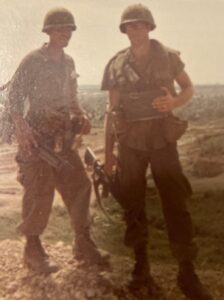
When Dave’s turn came, he took off running and soon heard a trainer hot on his trail. He managed to get away by low-crawling through ditches and underneath fences. He later had to avoid a large snake on some logs in the swamp he found himself in as he crossed the valley. At about 10:00 p.m., he heard a loudspeaker on a truck calling the soldiers to come out, but he was afraid it was a ruse and would take those that came out to the POW camp, which is what happened. He was glad he did not go because those that went to the POW camp were roughed up, with one soldier suffering a broken arm. At about midnight, a second truck came by calling for the soldiers to come out. Dave figured by now it was safe, so he revealed himself. He guessed right and was taken back to the barracks having successfully completed the AIT infiltration course.
Dave graduated from AIT on June 30, 1968. Because he was a squad leader at AIT just as he had been at basic training, he was immediately promoted to private first class (E-3). He had about two weeks leave before having to depart for Vietnam, so he returned to Minnesota to visit his wife and family. This visit was very hard because by the time Dave finished his training at Tigerland, he was mentally prepared for combat in Vietnam. Seeing his wife and family made him realize how much he missed them, but he couldn’t stop thinking about what lay in store for him in Vietnam. The emotional roller coaster made it very hard when it came time to leave.
With his wife, parents, and brothers and sisters waving, Dave said goodbye at the Minneapolis/St. Paul airport and flew to San Francisco, California. He took an Army bus from the airport to the Oakland Army Terminal to await a flight to Vietnam. He spent three or four days there pulling “KP” duty, but then finally heard the announcement directing him to report with his gear at 10:00 p.m. to the buses that would take him to Travis Air Force Base for his flight to Vietnam. Once he departed Travis, his plane refueled in Anchorage, Alaska, and Yokota, Japan. In Yokota, the plane’s air conditioning failed and the plane became uncomfortably hot. The pilot reassured the passengers, “Don’t worry about the air conditioning. It’s going to be a lot hotter in Vietnam.”
Dave landed in South Vietnam at Bien Hoa Air Base, about sixteen miles northeast of Saigon, on July 20, 1968. An Army staff sergeant came aboard to brief the new arrivals. He told them they were guests in South Vietnam and went over the rules and regulations they had to obey. He added they needed to do as instructed out in the field so they wouldn’t come back like those they could see out their windows. When Dave looked outside, he saw long lean-to structures with coolers containing the coffins of those killed in action and awaiting flights back to the “world”, which was how soldiers referred to the United States. The sight was a sobering introduction to Vietnam.
The men departed the plane and boarded buses with wire mesh covering the windows to prevent the Viet Cong from hurling grenades inside. Dave and the others, who were still wearing their summer khaki uniforms, couldn’t understand why they hadn’t been issued weapons. They’d learned about Viet Cong ambushes during their training at Tigerland, but now as they drove from Bien Hoa to Long Binh Army Base, located about twenty miles northeast of Saigon, they had no way to defend themselves if their bus was attacked. They were all relieved when they arrived safely within the guarded perimeter of Long Binh.
While at Long Binh, Dave was temporarily assigned to the 90th Replacement Battalion awaiting orders to his follow-on permanent assignment. Each day, he and the other new arrivals mustered at designated times with their personal gear to listen for their names to be called with their new assignments. They continued to ask when they would get their weapons and were told they would be issued once they reached their permanent unit. After a couple of days, Dave heard his name called. He was assigned to the 1st Infantry Division, whose headquarters was in Di An.
Dave and the other replacements assigned to the 1st Infantry Division loaded onto a truck for the twelve-mile ride to the Base Camp at Di An. After checking in with 1st Infantry Division Admin, they were told they could get something to eat before forming up for further instructions. Dave went to the enlisted men’s club, where he got a hamburger and fries. When he sat down to eat, he saw a guy he worked with at Gold Cross Ambulance! When the guy got drafted, Dave and his coworkers laughed at him. Now it was his friend’s turn to laugh.
As Dave walked back to where he was supposed to form up, he saw some soldiers behind a wall. He went to see what they were doing and saw them washing off the bodies of two soldiers killed in action the day before. It was another sobering reminder of the deadly serious business he was now involved in.
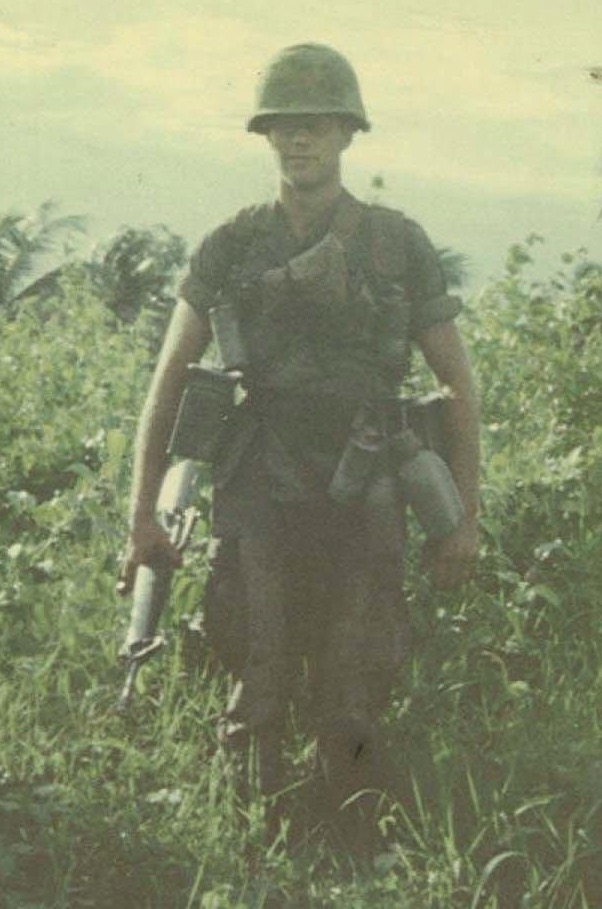
Dave learned the next morning he had been assigned to Alpha Company of the 1st Battalion, 28th Infantry Regiment (the Army’s famed Black Lions), operating out of the Quan Loi Base Camp. The base camp, constructed on a former French rubber plantation, was about four miles east of the town of An Loc and about seventy-two miles north of Saigon. Dave and a few others flew there on a C-7 “Caribou” transport aircraft, arriving around 6:00 p.m. When they arrived, they reported to the company Executive Officer, 1st Lieutenant (1LT) Ed Knoll. He told them to go to supply to get their weapons and equipment, clean their weapons, get some chow, and report back for guard duty on the base camp perimeter.
One of the other new arrivals, Private First Class (PFC) Bob Gruen, spoke up and told 1LT Knoll he was not supposed to be there. 1LT Knoll responded, “None of us are supposed to be here, but Gruen, tell me why you are not supposed to be here.” PFC Gruen said he was an armored personnel carrier (APC) driver and that was why he wasn’t supposed to be there. 1LT Knoll took him outside and walked him to where he could see the burned-out hulk of an APC. He said, “Do you see that? That was an APC. We call them coffins on wheels over here.” PFC Gruen concluded his new assignment was the right one after all.
On that first night, Dave stood guard duty half-way between two bunkers on the perimeter of the base camp. Around 1:30 a.m., he heard someone yell “fire in the hole”, which Dave thought meant there was going to be a controlled detonation somewhere. Suddenly, he heard a huge kaboom overhead. The concussion from the blast was so strong it launched him upwards into his shelter half (half of a tent). Not knowing what was going on, he remained at his post. He learned the next morning his position was just forward of an eight-inch artillery piece, and the explosion he heard was the big gun firing a shell at some distant target. Had he known about the gun’s location before he took his position, it would have saved him some late-night worry.
Before reporting to Alpha Company, Dave had one more hoop to jump through. This was “Jungle Devil School”, where Army instructors told the new arrivals to forget everything they learned in “the world” because they were going to teach them how things were done in Vietnam. Here they learned the tactics of the local Viet Cong units and how to conduct sweeps outside the base camp perimeter. On one of the training sweeps, a sniper shot and killed one of the trainees. The instructor reinforced with everyone the need to be ready for action everywhere, all the time.
After completing Jungle Devil School, Dave joined Alpha Company, which was working out of a night defensive position (NDP) just outside the village of An Loc. He was assigned to Lima platoon and his platoon leader, Staff Sergeant Terry Richardson, asked what he wanted to do. Dave said he’d do whatever the platoon needed him to do, so Sergeant Richardson offered him the option of being an M60 machine gun ammunition carrier. Sergeant Richardson told him if he did that, he wouldn’t have to “pull point”, which meant he would never be the soldier leading the platoon’s way through the jungle in search of the enemy. It also meant he had to carry two heavy cans of M60 ammunition in addition to his other gear when on patrol in the steaming jungle heat. Still, that sounded better than pulling point, so Dave took the position. His squad leader was Norm Meier.
For the rest of July and throughout August, Dave and the rest of Alpha Company conducted road sweeps by day to keep Highway 13 (Thunder Road) clear of the enemy. At night, they set ambushes for the Viet Cong operating in the area. Growing more confident and feeling like Lima platoon was really sticking it to the enemy during firefights and road sweeps, Dave told his platoon leader, “I think I’ll be able to survive a year over here.” Staff Sergeant Richardson told him to wait and see.
The waiting came to an end on September 12, 1968. Alpha Company’s commander, now 1LT Knoll, took a call early in the morning that they would be moving out from An Loc with a tank unit headed for the base camp at Quan Loi. While they resupplied at Quan Loi, some of the company’s veterans took pictures of the men as they prepared to leave, saying the company was going to a bad place and some would not be coming back. Dave and the other “newbies” thought they were just trying to scare them, but they couldn’t tell for sure. They would just have to find out for themselves.
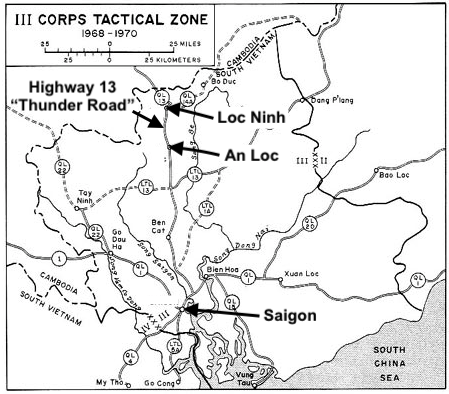
Chinook helicopters ferried Alpha, Charlie, Delta, and the Headquarters Companies of the 1st Battalion, 28th Infantry Regiment, from the base camp at Quan Loi to an airstrip at Loc Ninh, while Bravo Company remained behind near An Loc to fill the defensive positions vacated by Alpha Company. From Loc Ninh, the battalion headed northeast on foot to help sweep the area for NVA troops and help the 1st Battalion of the 2nd Infantry Regiment, First Infantry Division, which had already run into some serious trouble.
By the time Dave and Alpha Company got into position about four miles northeast of Loc Ninh early in the afternoon on September 12th, the monsoon rains were pouring down. Together with the other men of Lima platoon, Dave waded through the wet three-foot-tall jungle grass under the rubber trees on Alpha Company’s left flank. As 1LT Knoll pushed Alpha Company forward along the azimuth they have been given, they passed through the first of two checkpoints without incident. After Alpha Company passed through the second checkpoint on the way to the position where they were to remain for the night, they spotted an NVA soldier in a rubber plantation worker’s hut or “hootch”. He stood there looking at Alpha Company, which took him under fire and killed him. 1LT Knoll then sent out reconnaissance patrols from the Company’s right and left flanks. When they returned, they reported no NVA movement, so 1LT Knoll started moving the Company forward. Shortly thereafter, they spotted three more NVA soldiers, apparently trying to pull Alpha Company to the northeast. The Company took them under fire and killed two of them.
At about 2:30 p.m., 1LT Knoll told the Company to get down and then sent squads out on the Company’s flanks to conduct reconnaissance. The squad on the left from Lima Platoon encountered no one, but the eight-man squad on the right from Mike Platoon was ambushed. Everyone was killed or fatally wounded. Realizing they could not now rescue the ambushed squad, 1LT Knoll ordered the Company to move back seventy-five meters to prepare defensive positions and set out claymore mines in the event the NVA tried to overrun them. Dave saw green NVA tracer bullets flying everywhere and the men had to set off their claymore mines to beat back the NVA attacks.
By 4:30 p.m., Alpha Company’s situation had grown worse. 1LT Knoll called for assistance, indicating the Company was surrounded and would not survive the night without help. E Troop of the 11th Armored Cavalry responded by dispatching tanks and APCs to Alpha Company’s position, eleven of which managed to fight their way through. The armored vehicles formed a 360-degree perimeter and the Company withdrew inside their protective cover. Not deterred, the NVA fired rocket propelled grenades (RPGs), mortars, and small arms fire at the position throughout the night. Two APCs and members from Mike Platoon were, however, able to recover the bodies of the soldiers killed in the ambushed patrol. The bodies were flown from the area by a Chinook helicopter.
At around 1:30 a.m. on September 13th, a “Dustoff” helicopter arrived to evacuate the wounded and deliver ammunition and supplies. Also onboard was Lieutenant Colonel Leland C. Rew, the commander of the 1st Battalion, 28th Infantry Regiment, who flew in to direct the battalion’s operations as it set its sights on sweeping the enemy from nearby Hill 222 later in the morning.
After E Troop’s armor detached to assist other units, Alpha and Charlie Companies moved out from their respective positions to sweep toward Hill 222. Charlie Company met fierce resistance, so Alpha Company was ordered to cover their withdrawal. As they did, they too came under heavy fire. Flying over the battlefield, the 1st Infantry Division Commander, Major General Keith Ware, a World War II Medal of Honor recipient, directed Alpha Company by radio to engage. Shortly after the transmission, the general’s helicopter was shot down, killing him and everyone else on board. For the remainder of the day, Alpha and Charlie Companies were pinned down. U.S. air strikes pounded the NVA positions on Hill 222.
The ground assault on Hill 222 resumed in the morning on September 14th. Lima platoon had the lead for Alpha Company as they moved forward to take the hill. When Lima platoon’s point man and the rifleman behind him were hit by machine gun fire, Dave said “all hell broke loose”. The platoon and the rest of Alpha Company found themselves pinned down by three NVA machine guns, unable to continue forward or pull back. With both Dave’s and Lima platoon’s other M60 machine gun crew providing suppressing fire, the platoon leader, Staff Sergeant Terry Richardson, crawled forward and pulled his wounded point man, rifleman, and squad leader back to the Alpha Company perimeter. He then grabbed the platoon’s radio and crawled between the three NVA machine gun positions. Following an NVA communication wire, he worked his way to the top of Hill 222, where enemy troops from units in the NVA’s 7th Division manned a complex of camouflaged bunkers defending the Division’s base camp.
Using the radio he’d hauled to the top of the hill, Staff Sergeant Richardson began calling in tactical air strikes on the enemy’s positions. An hour into these calls, an NVA sniper chained to a tree shot him in the right knee. After he stopped the bleeding, he resumed calling in air strikes throughout the rest of the day, forcing the NVA to withdraw. With the enemy finally gone, Dave and the other members of the platoon’s two M60 machine gun crews climbed to the top of Hill 222 to recover Staff Sergeant Richardson. After they found him, Dave ran back down the hill at full speed carrying his ninety pounds of gear. Suddenly, he fell into a well-concealed four-foot-deep trench and his heavy helmet caused his head to snap back, injuring his neck. He was stunned and dazed but had to press on—there would be time to hurt later.
Dave credits God’s grace and the extreme heroism and bravery of Staff Sergeant Richardson with saving the lives of the eighty-five remaining members of Alpha Company pinned down as they proceeded up Hill 222 that day. Alpha and Charlie Companies took full control of the hill on the morning of September 15th. Alpha Company would lose 3 more men before the three-day battle ended, bringing its total losses to 20 of its 102 men, with eight men killed and twelve wounded.
After the battle at Loc Ninh, Dave and his unit returned to Quan Loi. Although no one in the unit ever wanted to go back to Loc Ninh, Alpha Company was ordered to return around September 20th after replacements filled the company’s vacant positions. This time, only a lone sniper in a rubber tree shot at the men. They killed the sniper, while no one from Alpha Company was wounded. The company returned to Quan Loi the same day.
Dave was now a seasoned veteran, routinely participating in search and destroy missions and nighttime ambushes. He was nearly killed in a friendly fire incident near the Song Be River when his M60 machine gun crew covered Alpha Company’s withdrawal and a U.S. AH-1 Cobra attack helicopter fired too close to his position. On another occasion, Dave was on a search and destroy mission when a mortar round landed on top of his platoon, wounding some members and blowing out his eardrums. These were just some of the close calls he endured during his patrols in the field after Loc Ninh.
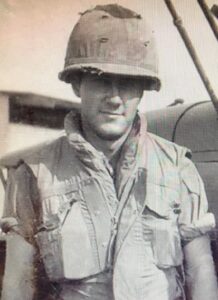
Around Christmas 1968, Dave mentioned to his first sergeant he would like to be considered for a position in the rear if the first sergeant knew of one. Dave heard nothing about it until the end of January 1969, when his first sergeant accompanied a portable mess kitchen to Dave’s NDP for the night. While the cooks prepared a warm meal for Dave’s unit, his first sergeant asked him if he was still looking for a job in the rear. When Dave said yes, the first sergeant told Dave to return to the Lai Khe Base Camp with him in the morning. Before leaving in the morning, Dave ate breakfast with the M60 machine gunner he carried ammunition for. When Dave arrived at Lai Khe later that morning, he learned the machine gunner had been killed by a land mine outside the NDP. The news hit Dave hard because had he not left for Lai Khe that morning, he knew he would’ve been walking next to the machine gunner when he stepped on the mine.
Dave’s new job was driving a supply truck for the battalion, but the job was anything but safe. Supply trucks traveling in convoys on Thunder Road were routinely ambushed, with the NVA and Viet Cong waiting for the convoy’s escorting tank and military police Jeep to pass before attacking the column of defenseless trucks. After two or three of these runs, Dave asked if he could drive his truck a short distance behind the escorting tank and Jeep, but ahead of the other vehicles in the convoy. Although this meant he would be completely on his own if attacked, he reasoned the enemy would not risk blowing an ambush for a single truck. His logic proved correct, and he drove the supply route along Thunder Road every day, traveling between Lai Khe, Di An, Long Binh, Bien Hoa, Tan Son Nhut, and Thu Duc without incident.
During his time as a truck driver, Dave developed connections at the bases he delivered supplies to and became an expert “scrounger”. On one scrounging mission, he traded camouflaged poncho liners for two pallets of lumber to construct an officer’s club at Lai Khe. On another occasion, he negotiated a deal for a water pump the battalion needed. He continued driving his truck and scrounging until his tour of duty came to an end in July 1969. He still had one more close call, though. Two days before he left, an enemy mortar round hit the “hooch” (tent) next to his. No one was hurt, but it was a sobering reminder of the danger he faced until he finally departed the country. Despite his many close calls, Dave was never wounded. He did, however, contract malaria as a result of his exposure to the disease-carrying parasite in the Vietnamese jungle.
Now a sergeant, Dave left Vietnam on July 20, 1969, one year to the day after he arrived. The route back took him through Clark Air Base in the Philippines, Hawaii, Travis Air Force Base, and finally Oakland. From there he caught a flight to Minnesota, where he walked into his parents’ house on the same day Neil Armstrong walked on the moon. His Army service wasn’t over yet, though, as he still had six months left on his service commitment. He finished his tour at the 4th Combat Support Training Brigade at Fort Ord, California, where he processed orders for soldiers entering and graduating from Cook School. Twice he was offered tempting follow-on positions, first as a drill instructor and second with the Ceremonial Old Guard in Washington, DC, but he turned down both opportunities. He was even offered a promotion to staff sergeant if he elected to stay in the Army. He needed to be a civilian, though, at least for a little while, and after being discharged from the Army in February 1970, he took a job with IBM in Reno, Nevada.
Although it looked like Dave’s military career was over, in fact, it was just beginning. By coincidence, a salesman Dave worked with at IBM was the commander of a Marine Reserve rifle company. When he asked Dave to sign on, Dave couldn’t refuse. He’d always wanted to be a Marine and this was his chance. Although he had to revert to corporal (E-4) “because the Marines do things differently than the Army”, Dave took the oath in July 1970 and, because of his prior administrative experience at Fort Ord, became the company clerk for India Company, 3rd Battalion, 23rd Marine Regiment, 4th Marine Division. Before he was promoted to sergeant, IBM transferred him to Minneapolis, where there were no Marine Reserve assignments that worked for him. His brief Marine experience ended in September 1972.
Again, it looked like Dave would settle into civilian life, but this time the Army Reserve beckoned him to sign on in November 1973 with the 5501st U.S. Army Reserve Hospital at Fort Snelling, Minnesota. Dave became an operating room technician, relating back to the hospital work he enjoyed so much before he was drafted. As if the Reserve duty and working full-time for IBM weren’t enough, Dave also completed the Emergency Medical Technician (EMT) Course at Inver Grove Community College and worked part-time for the Smith Ambulance Company and the Emergency Room at Methodist Hospital.
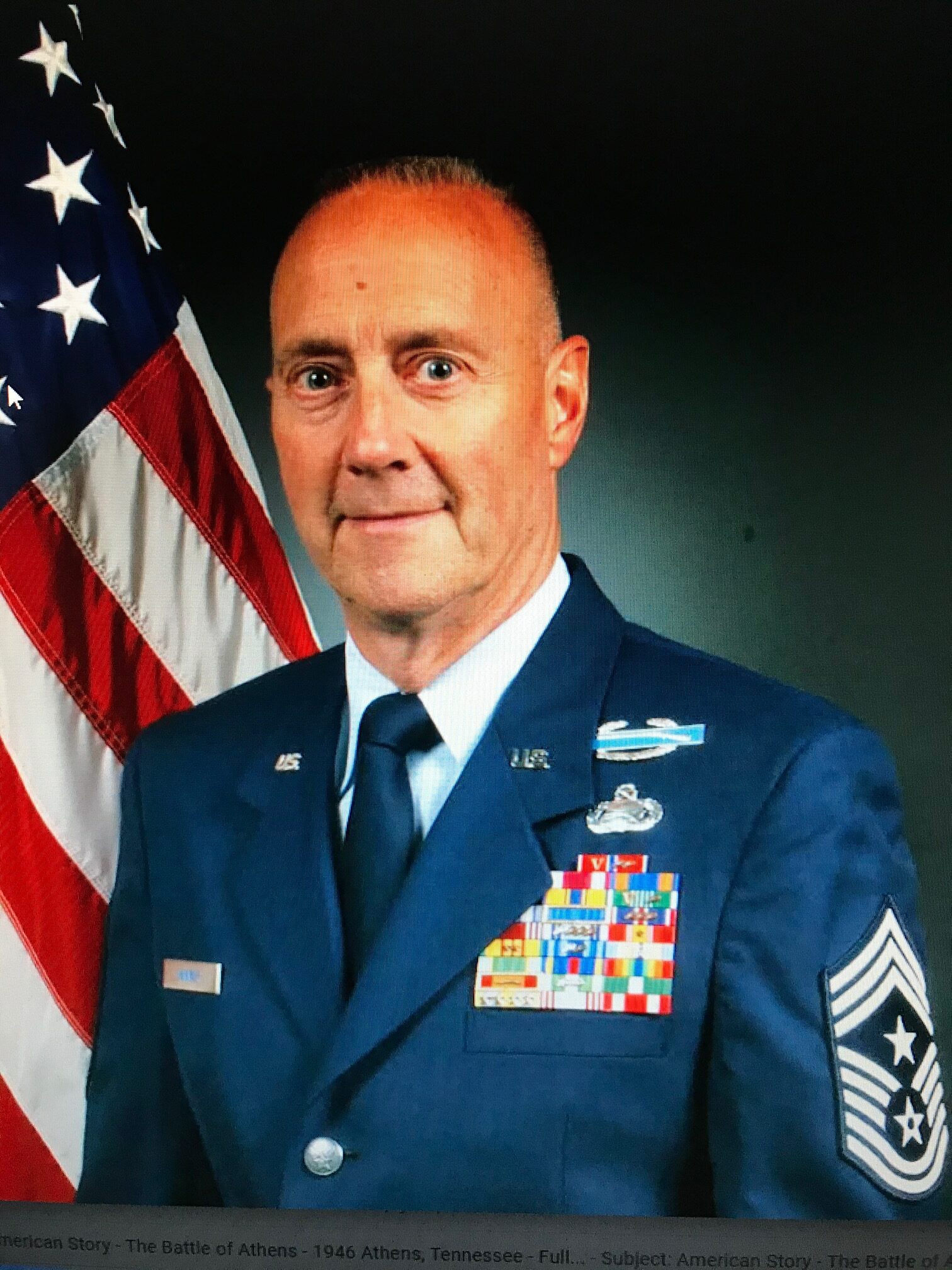
Dave’s part-time gig with the ambulance company proved providential. The company’s dispatcher served with the Minnesota Air National Guard’s 133rd Airlift Wing Medical Squadron at the Minneapolis/St. Paul International Airport. He recommended Dave switch services again and Dave did. So began Dave’s long affiliation with the Minnesota Air National Guard and the 133rd Airlift Wing. He started out in August 1975 as a medic, then progressed to an optometry technician and a unit training manager, where he handled unit training for the Wing’s medical squadron.
Dave went on to serve as a training manager and acting First Sergeant in the 133rd Airlift Wing’s Mission Support Flight. He subsequently received the Commandant’s Award at the Air Force’s First Sergeant’s Academy and served as the First Sergeant in the Wing’s Support Group, where he was selected as both the Wing and Minnesota Air National Guard First Sergeant of the Year. His responsibilities expanded to human resource advisor, first at the Wing level and later at the state-wide Air National Guard level. While at the Wing, Dave was selected as the Air National Guard Human Resources Advisor of the year. More important, the Air National Guard recognized Dave’s seasoned leadership, promoting him to the highest enlisted rank in the Air Force, Chief Master Sergeant (E-9), in 2001.
Dave served as the 133rd Airlift Wing’s Command Chief Master Sergeant from December 2003 to March 2005. In this last position, and with the Global War on Terrorism in full-swing, Dave was responsible for the 1,134 enlisted men and women assigned to the Wing, while still working full-time for his civilian employer, now CoBank/Farm Credit Leasing in Minneapolis. Oftentimes he worked eighty-hour weeks to make sure both his military and civilian jobs got done. Finally, for fifteen of the years Dave was assigned to various units in the 133rd Airlift Wing, his son, Mark, was also assigned to the Wing as a member of the 133rd Security Forces Squadron.
Dave retired from the Air National Guard when he turned sixty in 2005. He is grateful for the many leaders he worked for throughout his career who led by example and helped him succeed. He and his wife, Janet, now live in Bloomington, Minnesota, spending time with their five children (Mark and Kelly from Dave’s first marriage and Rick, Jeff, and Chris from Janet’s first marriage), eleven grandchildren, and one great grandchild. He continues to serve our military by volunteering at the Armed Forces Services Center at Minneapolis/St. Paul International Airport. In addition, he serves as an advocate for veterans and their families, helping them navigate through the Veterans Administration system. As always, he is active in his church.
Dave’s military decorations include the Bronze Star with “V” device (with two oak leaf clusters), the Meritorious Service Medal (with four oak leaf clusters), the Army Commendation Medal with “V” device (with one oak leaf cluster), the Combat Infantryman Badge, the Air Medal, the Vietnam Service Ribbon, and the State Active-Duty Ribbon. The “V” device indicates the award was given for valor in combat.
Dave is a Distinguished Member of the Black Lions Regiment, an association of those who honorably served in the Army’s 28th Infantry Regiment. Since November 2000 and in every year but one since then (2020), Dave and other members of Alpha Company have met over the Veterans Day holiday to talk about their shared experience in Vietnam and to honor those who never made it home.
Voices to Veterans is proud to salute Command Chief Master Sergeant Dave Himmer, U.S. Air Force (retired), for his many years of distinguished service to our nation. He answered our country’s call during the Vietnam War, serving in the Army with courage and honor in the face of a determined enemy. He then continued to serve in both the Marines and the Air Force, becoming a senior leader and exemplifying selfless service for the next generation of men and women in our armed forces. We thank him for all he has done and wish him fair winds and following seas.
If you enjoyed Dave’s story, please sign up for the Voices to Veterans Spotlight monthly newsletter by clicking here. Once each month, you’ll receive a new written veteran’s story and a new podcast directly in your mailbox. Best of all, it’s free and you can unsubscribe at any time.
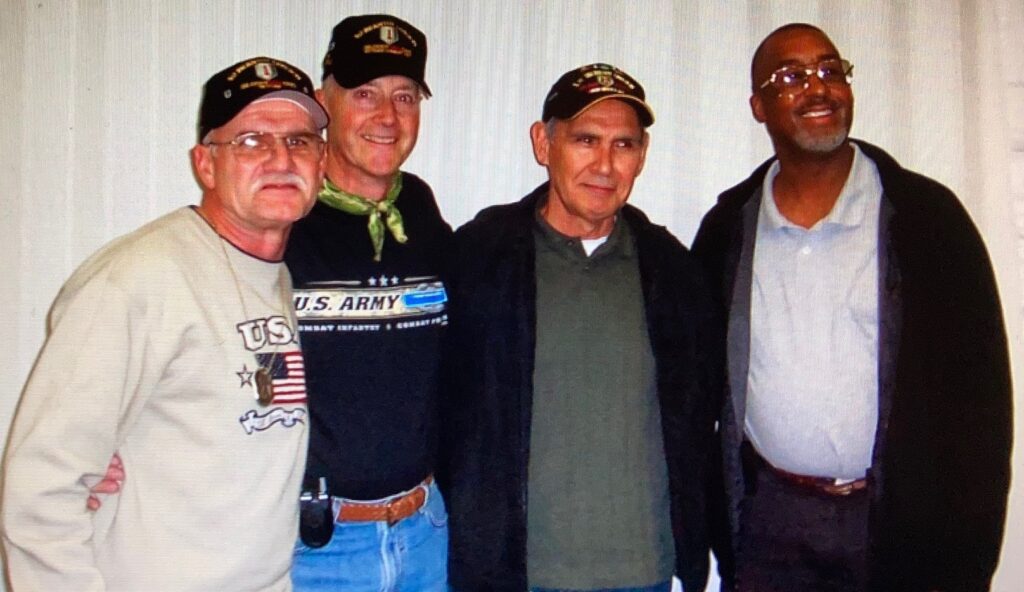

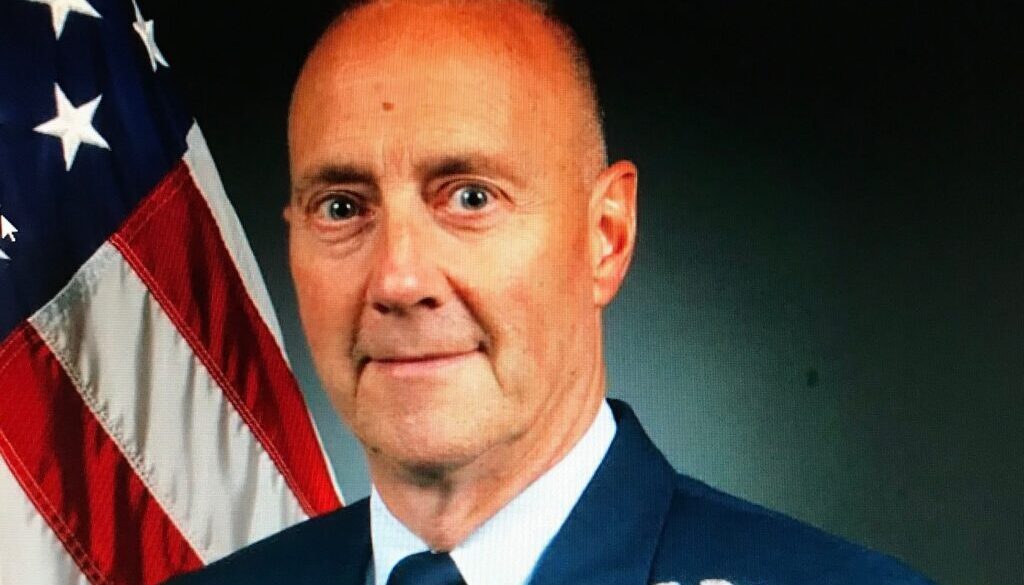
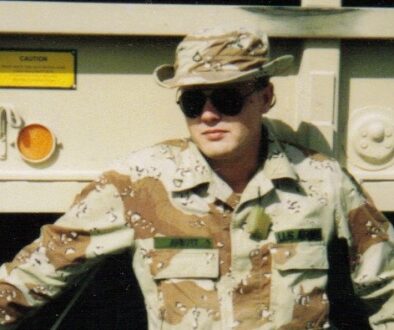
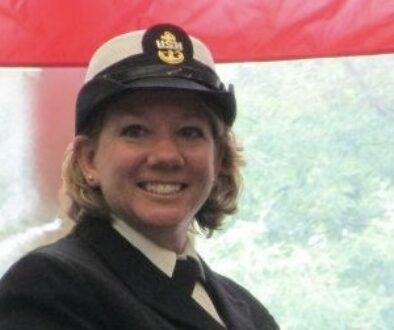
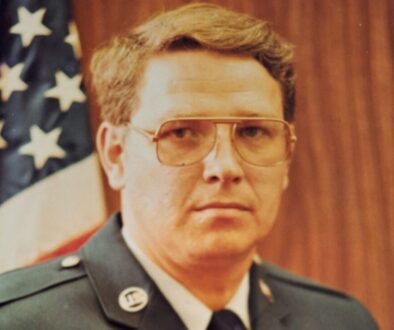
September 12, 2021 @ 2:04 PM
Thanks for your article on Dave Himmer. I was with he and his company on September 12, 1968.
My name is Ron Parker, to Dave AKA Defiant 91.
If permissible please have Dave to contact me.
My remembrance: https://youtu.be/t6FuR3f_258
Thank you.
September 12, 2021 @ 8:01 PM
Ron,
Thanks for taking the time to read Dave’s story and for your service in Vietnam. I’ve passed along your contact information.
V/r,
Dave Grogan
September 17, 2021 @ 10:32 AM
Thank you for your distinguished service to our Great Country my fellow Military Brothern. I served U,SA F. Nov.68/ March73 Ssgt. Godbless and Godspeed!!!
September 18, 2021 @ 7:56 PM
Rodney – thanks for your service and for taking the time to read Dave’s story.
September 18, 2021 @ 7:48 PM
Glad you made it home. I Served with CSC 4/40 Armor, scout platoon 76/77 Ft Carson
September 18, 2021 @ 7:56 PM
Mike, Thanks for your service and for taking the time to read Dave’s story.
September 27, 2021 @ 9:21 AM
Thank you for this wonderful article on my husbands brother. We are all eternally grateful that Dave gave his all and returned home safely. Thanks to all of the servicemen and servicewomen and their families. May we never forget.
September 27, 2021 @ 7:39 PM
Amy – thanks for taking the time to read Dave’s story – I know your comment will mean a lot to him.
October 8, 2021 @ 8:38 PM
Thank you for telling my big brother’s story. Wow, what a nice job you did! We know we were truly blessed to have Dave return home safely. His dedication/hard word to the service exemplifies the way we were raised – give it your all no matter what your doing and Dave did. I thank Dave and the countless others who have sacrificed/served and their families – they do not get enough recognition for all that they endured protecting our country. God Bless America.
October 9, 2021 @ 11:53 AM
Jean – thanks for taking the time to read your brother’s story. I know he appreciates it (as do I)!
February 10, 2022 @ 11:02 PM
David,
Thanks for providing your platform to tell my Dad’s story. I’ve been truly blessed to have a Dad who is such a Humble, Christ Centered, Honorable and Integrity Driven example as a father, fellow Airman, mentor and friend. God blessed him with a storied and eventful journey in life, which the military was and continues to be such a big part of.
Because of his example, I joined the Minnesota Air National Guard and spent 15 years (1991-2006) as a Security Forces Craftsman (Military Police), attaining the rank of TSgt/E-6. It was an honor to have been able to serve for all but my last year of service together on the same installation with my Dad.
It is because of the focus on Christ, a great family and the great training and leadership he had, that my Dad was able to make it through so many years of service, across three different branches, different locations and career fields.
It is wonderful to have such a great platform to tell the stories of our Vets.
God Bless you and your team!
February 12, 2022 @ 8:08 AM
Mark – Thanks so much for your feedback and for your service in the military! I definitely agree with you – your dad is a great man!
Technical Sergeant Mark Himmer, U.S. Air Force – Service is a Family Affair – David E. Grogan
March 17, 2022 @ 8:16 PM
[…] had another powerful influence on his father’s side – Dave Himmer, his father. Mark’s father is a decorated Army veteran from the Vietnam War, who went on to do a […]